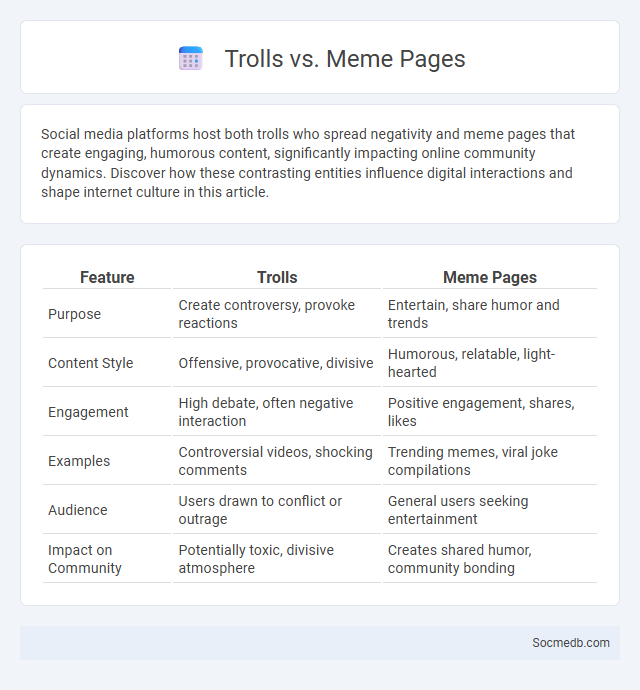
Photo illustration: Trolls vs Meme Pages
Social media platforms host both trolls who spread negativity and meme pages that create engaging, humorous content, significantly impacting online community dynamics. Discover how these contrasting entities influence digital interactions and shape internet culture in this article.
Table of Comparison
| Feature | Trolls | Meme Pages |
|---|---|---|
| Purpose | Create controversy, provoke reactions | Entertain, share humor and trends |
| Content Style | Offensive, provocative, divisive | Humorous, relatable, light-hearted |
| Engagement | High debate, often negative interaction | Positive engagement, shares, likes |
| Examples | Controversial videos, shocking comments | Trending memes, viral joke compilations |
| Audience | Users drawn to conflict or outrage | General users seeking entertainment |
| Impact on Community | Potentially toxic, divisive atmosphere | Creates shared humor, community bonding |
Understanding Internet Trolls: Definition and Impact
Internet trolls are individuals who deliberately provoke, disrupt, and spread negativity across social media platforms by posting inflammatory or off-topic messages. Understanding troll behavior helps you protect your online presence and maintain a positive digital environment. Their impact includes increased stress for users, deteriorated community trust, and potential harm to mental health.
The Evolution of Meme Pages in Online Culture
Meme pages have transformed dramatically, evolving from simple humor hubs to influential online communities that shape digital culture and trends. You can observe how these pages leverage viral content, user interactions, and platform algorithms to amplify their reach and impact across social media networks like Instagram, TikTok, and Twitter. This evolution highlights the power of memes in shaping social discourse, marketing strategies, and even political commentary within the digital landscape.
Trolls vs. Meme Pages: Key Differences
Trolls on social media primarily aim to provoke, disrupt, and spread negativity through inflammatory comments and controversial posts, often targeting individuals or groups to elicit emotional reactions. Meme pages, by contrast, focus on creating and sharing humorous, relatable content that fosters community engagement and entertainment without malicious intent. Understanding these distinctions helps users navigate online interactions, recognizing when content is meant for amusement versus when it serves to incite conflict or spread harm.
The Motivations Behind Trolling and Meme Sharing
Trolling and meme sharing on social media are driven by motivations such as seeking attention, expressing dissent, or fostering community through humor. Users often engage in these activities to challenge social norms, provoke reactions, or create viral content that resonates within digital subcultures. The interplay of anonymity and platform algorithms amplifies the impact and spread of trolling and memes, influencing online discourse and digital identity formation.
How Meme Pages Respond to Troll Activity
Meme pages often employ strategic humor and timely responses to counteract troll activity, effectively diffusing potential negativity while maintaining audience engagement. By leveraging trending memes and relatable content, these pages can neutralize trolls without escalating conflicts, ensuring your social media experience remains positive and entertaining. Monitoring comment sections and using content moderation tools also play a critical role in preserving the page's community vibe.
The Role of Humor: Satire vs. Harassment
Humor on social media plays a critical role in shaping online interactions, with satire often serving as a powerful tool for social commentary and critique. Satirical content uses irony and exaggeration to highlight societal issues, fostering engagement and reflection without causing harm. In contrast, harassment involves targeted, repetitive negative behavior aimed at intimidating or belittling individuals, which undermines constructive discourse and violates community guidelines.
Social Media Platforms: Moderation and Community Guidelines
Social media platforms employ strict moderation policies and community guidelines designed to foster safe and respectful interactions while curbing harmful content such as hate speech, misinformation, and harassment. Algorithms combined with human moderators identify and remove posts that violate these rules, ensuring compliance with legal standards and enhancing user experience. Understanding these guidelines helps you navigate and contribute positively to diverse online communities.
Audience Engagement: Who Follows Trolls and Meme Pages?
Audience engagement on social media reveals that younger demographics, particularly Gen Z and millennials, are the primary followers of trolls and meme pages due to their preference for humor and irreverent content. These users are attracted by the viral nature of memes and the provocative style of trolls, which drives high interaction rates like comments, shares, and reactions. Understanding this engagement helps you tailor content strategies to effectively capture and retain this highly active and participatory audience segment.
Legal and Ethical Implications of Trolling and Meme Posting
Trolling and meme posting on social media platforms involve significant legal and ethical considerations, including potential violations of defamation, harassment, and copyright laws. You must be aware that engaging in harmful or offensive content can lead to account suspension, legal action, or reputational damage. Ethical social media use requires respecting others' rights and promoting positive, responsible communication.
The Future of Online Humor: Memes, Trolls, and Digital Communities
The future of online humor revolves around evolving memes, dynamic troll interactions, and vibrant digital communities shaping internet culture. Your engagement with these elements influences content trends, platform algorithms, and community norms across social media. Understanding this ecosystem is essential for navigating and contributing to the increasingly influential landscape of digital humor.
 socmedb.com
socmedb.com